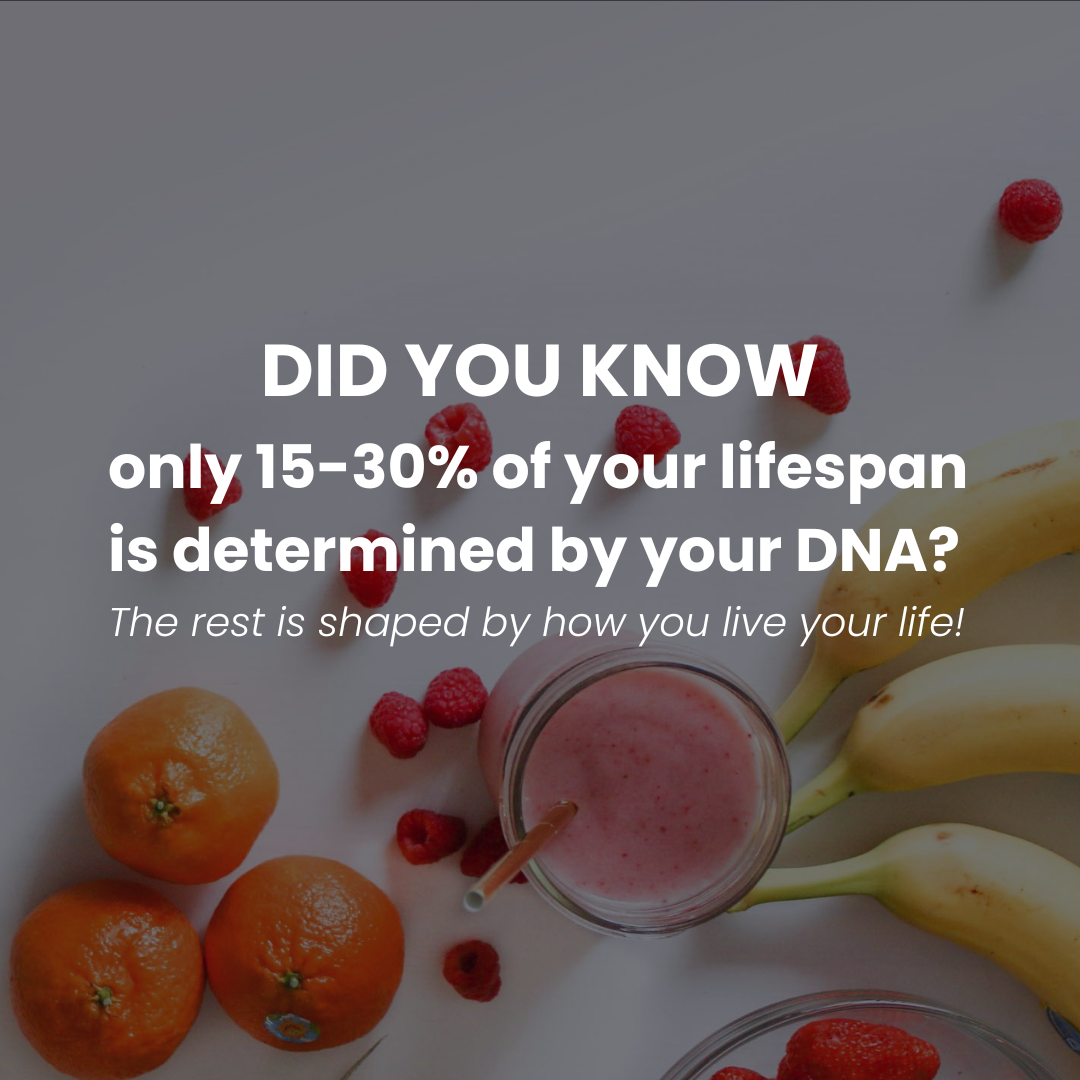When it comes to how long and how well we live, genetics often gets the spotlight. After all, we’ve been taught that our DNA holds the secrets to our health, aging, and lifespan. While it’s true that our genetic blueprint plays a role, research shows that only 15-30% of our lifespan is determined by our genes. The remaining 70-85% is influenced by lifestyle choices, environmental factors, and behaviors. In other words, the way you live can have a far bigger impact on your longevity than your inherited genes.
Let’s dive into the science behind this and explore how you can make changes to live a longer, healthier, and more fulfilling life.
The Role of Genetics: A Small, Yet Important Piece
Our DNA carries the instructions for how our bodies function and develop. Certain genes are linked to longevity and resilience against diseases, while others may predispose us to health risks. For example, you might inherit a gene that slightly increases your risk of heart disease or diabetes. However, having a genetic predisposition doesn’t guarantee that you’ll develop these conditions.
This is where epigenetics comes in. Epigenetics refers to how lifestyle factors like diet, exercise, and stress management can influence which genes are activated or deactivated. In essence, while your genes may load the gun, your environment and choices pull the trigger.
The Lifestyle Factors That Matter Most
- Nutrition
- A diet rich in whole, nutrient-dense foods can dramatically lower the risk of chronic diseases like heart disease, diabetes, and cancer. Blue Zones—regions known for their high concentrations of centenarians—emphasize plant-based diets filled with vegetables, fruits, legumes, nuts, and healthy fats.
- Avoiding ultra-processed foods, added sugars, and excessive salt is equally important for maintaining long-term health.
- Physical Activity
- Regular movement is one of the most powerful predictors of longevity. Exercise strengthens the heart, improves circulation, and enhances mental health. It doesn’t have to be strenuous—even 30 minutes of brisk walking a day can make a difference.
- Blue Zone residents engage in natural, daily physical activity like gardening, walking, or manual labor, proving that you don’t need a gym to stay fit.
- Stress Management
- Chronic stress accelerates aging by shortening telomeres, the protective caps on the ends of your chromosomes. Practices like mindfulness, meditation, deep breathing, or simply spending time in nature can reduce stress and improve overall well-being.
- Quality Sleep
- Sleep is when the body repairs itself. Poor sleep is linked to inflammation, obesity, and a higher risk of chronic diseases. Aim for 7-9 hours of quality sleep each night to allow your body and mind to rejuvenate.
- Social Connections
- Loneliness is as harmful to health as smoking 15 cigarettes a day. Strong social ties—with family, friends, or community—are vital for mental and emotional health. Building meaningful relationships can add years to your life.
Blue Zones: A Case Study in Longevity
Blue Zones are regions where people regularly live into their 90s and 100s while remaining healthy and active. These areas include Okinawa (Japan), Sardinia (Italy), and Nicoya (Costa Rica). Interestingly, their longevity isn’t due to genetics but rather to common lifestyle habits:
- Plant-based diets
- Regular, low-intensity physical activity
- Strong social bonds
- Stress reduction through spiritual or mindfulness practices
- A sense of purpose, or “why” to wake up every morning
These habits collectively highlight the power of lifestyle in determining lifespan.
How to Take Control of Your Longevity
Here are actionable steps you can take to stack the odds in your favor:
- Adopt a Balanced Diet
- Prioritize whole foods, healthy fats, and lean proteins.
- Limit processed foods and sugary snacks.
- Move More
- Find activities you enjoy, whether it’s dancing, hiking, or yoga.
- Aim for at least 150 minutes of moderate exercise per week.
- Manage Stress
- Incorporate mindfulness, deep breathing, or journaling into your daily routine.
- Don’t hesitate to seek support from friends, family, or professionals.
- Prioritize Sleep
- Create a calming bedtime routine and avoid screens before bed.
- Maintain a consistent sleep schedule.
- Cultivate Relationships
- Reach out to loved ones regularly.
- Participate in community activities or join groups that align with your interests.
Conclusion: The Power of Choice
While we can’t change our DNA, we have the power to shape our future through daily choices. By adopting healthier habits, you can not only extend your lifespan but also improve your quality of life. Remember: your genes might set the foundation, but how you live builds the house.
Start small. Each positive change you make today is an investment in a healthier, longer tomorrow.

